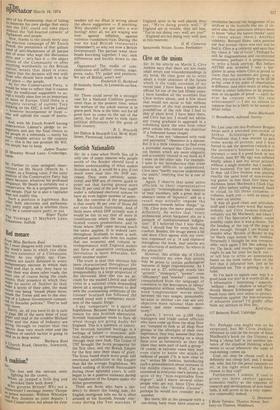Clive on the unions
Sir: In his article on March 2, Clive Jenkins says that there are too many small errors and misunderstandings in my book. He then goes on to write about a trade unionism of the future which is the trade, unionism of my recent past. I have been a trade union official for ten of the last fifteen years. I have handled all the novelties that Clive writes about, and a few more that would not occur to him without experience of the real pressures and possibilities of the role that I had to play at plant level. I have been there, and Clive has not. I would not advise any young graduate to approach in a colonising spirit the men from other print unions who elected me chairman of a federated house chapel. True, I am not "obsessed with rank and payments." Obsession is a disease. But it is a little vexatious to find even a journalist manque like Clive trotting out themes which are more elegantly and accurately treated in my book as if I were on the other side. For example, I note in my introduction that trade unions are difficult to understand. Clive says "hardly anyone understands the union," implying that he is one of the few.
Again, 'I observe that some union officials in their representative capacity "overemphasize the miseries of their members, talk a great deal in abstract terms of 'injustice', and as a result may actually impede the movement towards better things." (p. 178). Clive puts the same point rather differently. He writes that "every professional union bargainer sits on a pinnacle of institutionalised indignation". If I believed that I was doing that, I should fear for more than my comfort. Besides, the image seems a bit odd since Clive agrees with my view, first expressed on p. 14 and repeated throughout the book, that unions are not structures of authority. So where is the pinnacle?
However, this artless slip of Clive's does reinforce my view that unions_ may be prone to certain pathological features of large organisations. As I write on p. 27, although words like "growth", "monopoly", "power", even "efficiency" and "market", cannot be. transplanted from the language of commerce to the description of labour organisation without redefinition, "the word 'conglomerate' moves easily between the two usages, presumably because in neither can one see any objective more rational than more money and more members respectively."
Again, I write on p.168 that managers and trade union officials who have come up from the shop floor are "tempted to look at all shop floor groups in the afterlight of their own experience; they may assume that they know the people working on a shop floor now as intimately as they did when they were part of such a group." Of course, in extreme cases they may even claim to know the minds of millions of people ("It is now clear to me," writes Mr Jenkins, introducing such a generalisation about everyone in the middle classes). Well, I'm not interested in everyone else's income, in spite of my "non-negotiable first degree", and I know several other people who are not. Since Clive does not define the "middle classes", perhaps he would not consider me a member.
But there, life at the pinnacle with a one-string harp must have sources of
revelation beyond the lungpower of an artificer in the foothills like me. (I observe also that politicians always seem to know "what the nation thinks" until it votes about them.) Another celebrity, Bernard Shaw, once pointed out that normal vision was rare and he had it. Clive is a celebrity and says that my vision is "out of focus". Perhaps he will be magnanimous and recommend treatment; perhaps it is preposterous to write a book anyway. But before ASTMS was invented I was a bargainer in areas where Clive is proud to claim that his members are going; a priori, my vision is as likely to be 20/20 as his, even if my point of observation is different. And since much of what he writes is either ludicrous in its pretension or incapable of proof — can't he ever be content with his real achievement? — I see no reason to suppose that he is likely to be sound on detail either.
Innis MacbeathII Broadhurst, Ashtead, Surrey.


































 Previous page
Previous page